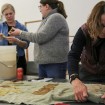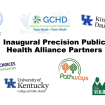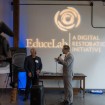UK’s Parsons plays central role in 'reading the unreadable'
In 79 CE, the eruption of Mount Vesuvius buried the ancient Roman cities of Pompeii and Herculaneum in 20 meters of hot mud and ash. Centuries later, the work by University of Kentucky researchers continues to resurrect a vast library of carbonized Herculaneum papyrus scrolls.
This video is the second in a series featuring the innovations and research of the UK Digital Restoration Initiative Team, led by Brent Seales, UK Stanley and Karen Pigman Endowed Professor of Heritage Science.
Stephen Parsons, UK Digital Restoration Initiative visiting scholar, has been dedicated to this research — using cutting-edge artificial intelligence (AI) and machine learning to read and uncover ancient texts, including the ever-challenging Herculaneum scrolls.
After graduating with a double major in computer science and international studies in 2016 from UK, Parsons worked at Microsoft. He returned to UK to complete his doctorate and rejoin Seales on the digital restoration of ancient artifacts.
“My work as a researcher on the Digital Restoration Initiative has been as a computer scientist. My role is to try to develop technical methods that help us essentially read more of these materials and uncover more of these texts,” Parsons said.
In 2019, he was awarded the prestigious National Science Foundation (NSF) Graduate Research Fellowship. As part of his research, Parsons has written sophisticated AI programs and built machine learning networks in hopes of revealing hidden text. “Virtual unwrapping” software takes a 3D X-ray from a micro-CT machine and pushes it through a step-by-step computerized process to find the ink and flatten the document so it can be read.
“I instantly recognized what a central role Stephen could play in our software development and experimental plans,” Seales said. "He is extremely systematic in the way he approaches his research tasks. The design and organization in his machine learning frameworks allowed us to make steady, durable and sometimes dramatic progress toward the goal of revealing Herculaneum ink. He created software scaffolding and executed careful designs for launching, managing, organizing and evaluating many computer years of massively parallel machine learning experiments. These experiments are the bedrock of our current breakthroughs.”
Parsons also serves as research advisor for the Vesuvius challenge, a global competition launched earlier this year.
“The Vesuvius challenge is a unique opportunity. We released a lot of our code and methods, and we invited people to build on them and contribute to help us move our research forward,” Parsons explained. “The pace of machine learning has been absurd. Things are moving quickly. I think we are seeing across the board that a lot more is possible than we thought and that it might happen sooner than we thought.”
Seales, in partnership with the Digital Restoration Initiative: EduceLab, the Library of the Institut de France and founders of the Vesuvius Challenge, will announce a major breakthrough in the two-decade journey to uncover ancient wisdom and read the Herculaneum scrolls 4 p.m. Thursday, Oct. 12. The panel discussion will be available via livestream here: https://engr.uky.edu/live.


